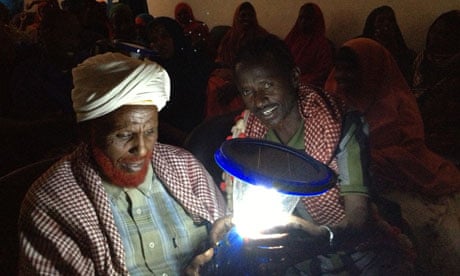Divyesh Thakkar has just returned from refugee camps in Ethiopia, where he was surprised to see portable solar lanterns designed by his company still in use three years after their distribution.
The batteries for the prototype lamps were expected to last only two years, but were still functioning at the Jijiga camp near the Somali border.
"It's amazing they're still working and to see them changing lives," said Thakkar, who is based in Leicester. "People are going to university thanks to the lamp."
The solar lantern, which looks like an old-fashioned kerosene hurricane lamp, won an innovation award last year at AidEx, an annual trade show bringing together suppliers and buyers of products for the aid industry. The lamp has a built-in solar panel to charge its four AA-sized batteries.
The lantern has an obvious advantage over kerosone-fuelled equivalents: with no flame or smoke emissions, it is safer and more environmentally friendly. The batteries are made for 500 cycles, or about two years, but the longevity of the lamps in Ethiopia has come as a pleasant surprise. In a novel twist, the lantern, which costs $38 (£24.50), can also be used to charge mobile phones.
The award provided a huge fillip for Thakkar's company, Sunlite. As word spread, relief agencies placed increasingly large orders. About 100,000 of the lamps have been (or are being) used after emergencies in Japan, the Philippines, Thailand and Syria.
Sunlite makes 15,000 lamps a month at two plants in India, including one in a special economic zone in Gujarat state.
Next month, there will be a new winner at AidEx in Brussels, the third year of the award. The innovation award sits alongside a crowded field of honours in the development world, although AidEx is geared more towards humanitarian needs.
Awards seem to be proliferating. Last month, 53 finalists met in Washington to showcase ideas to save the lives of mothers and newborns in developing countries. The award is given by the Saving Lives at Birth partnership, launched in 2011, which includes USAid, Norway, Grand Challenges Canada, backed by the Canadian government, the UK's Department for International Development, and the Bill & Melinda Gates Foundation.
In October, the Mo Ibrahim foundation will announce its prize for achievement in African leadership, established in 2007. Past winners include presidents Joaquim Chissano and Festus Gontebanye Mogae, of Mozambique and Botswana respectively, although the prize is not awarded if no one meets the criteria.
Sceptics may wonder whether these accolades contribute meaningfully to development, or exist only to make donors feel good while sidestepping more fundamental, structural issues. For instance, the Gates foundation awarded $100,000 to the California Institute of Technology last year for designing a solar-powered toilet that breaks down water and human waste into hydrogen gas for use in fuel cells.
The competition was for "next-generation" toilets to improve sanitation in the developing world. Would that money have been better spent on supporting community-led total sanitation – a project to end open defecation that has had considerable success?
Calestous Juma, international development professor at the Kennedy school of government and a nominator, judge and promoter of new types of prizes, sees awards as part of a complex ecology of financing innovation that includes many other instruments. He believes there should be more prizes for humanitarian work and development.
"Doing humanitarian work may look like a thankless job. Yet it is driven by the instinct of empathy that makes us human," said Juma, author of The New Harvest: Agricultural Innovation in Africa. "Honouring, rewarding, celebrating and inspiring work in this area is more needed today than ever. This is an area that can use more societal recognition, especially at a time when the whole aid industry is under scrutiny."
However, Juma says prizes need to be carefully thought out. "Many organisations are launching them without thinking carefully about what prizes can do or cannot do."
The AidEx challenge's lead judge, Michael Pritchard, inventor of the Lifesaver water bottle, says the award is not so much about the money – £2,000 – as validation, although the publicity can be a much-needed boost.
"The validation goes an awfully long way to get the product developed and provides a big leg-up into getting it into the market," he said. "It gets written up all over the world and gets the oxygen of publicity."
As for Thakkar, he says winning the AidEx award has been a positive experience: "Winning the award made a huge difference, it increased publicity. People look more favourably on us and [that] gives us an extra edge. We don't have to sell it as much. But we don't want to be just appreciated, we want the lamp to be used extensively."

Comments (…)
Sign in or create your Guardian account to join the discussion